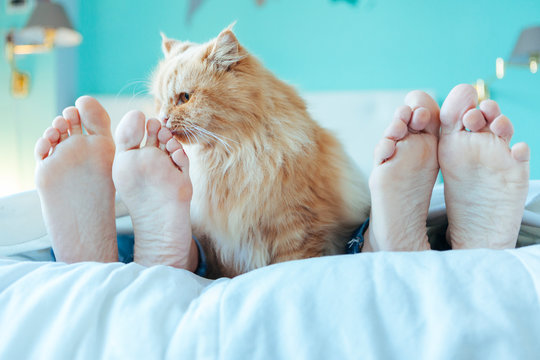If you’re a cat lover, you already know the joy and comfort that comes from cuddling up with your furry friend. But did you know that cats can actually improve our mental health and well-being in ways we may not even realize? From reducing stress and anxiety to boosting our mood and providing a sense of purpose, these feline companions have a special place in our hearts and minds. So, if you’re ready to discover just how wonderful cats can be for our mental health, read on to find out more!
The Purrfect Therapist: How Cats Help Improve Our Mental Health
Cats have been known to provide comfort and companionship to their owners, but did you know that they can also help improve our mental health? Studies have shown that owning a cat can reduce stress levels and decrease symptoms of anxiety and depression. The act of petting a cat has been found to release oxytocin, a hormone that promotes feelings of happiness and relaxation. In addition, the rhythmic sound of a cat’s purr has been shown to have a calming effect on the human body. This is why cats are often used in therapy settings to help individuals with mental health issues. Overall, having a feline friend can provide emotional support and improve our overall well-being.
Feline Friends and Happiness: The Positive Impact of Cats on our Well-being
Feline Friends can have a significant impact on our overall well-being. Studies have shown that interacting with cats can help reduce stress and anxiety levels, lower blood pressure, and even decrease the risk of heart disease. The act of petting a cat releases endorphins, which are feel-good hormones that can boost our mood and promote relaxation.
Additionally, owning a cat can provide a sense of companionship and reduce feelings of loneliness or isolation. Cats are also known for their playful nature, which can encourage us to be more active and engage in physical activity. This can lead to improved physical health and increased energy levels.
Furthermore, cat ownership has been linked to improved mental health outcomes such as decreased symptoms of depression and anxiety. The responsibility of caring for a pet can provide a sense of purpose and routine, which can be beneficial for those struggling with mental health issues.
Overall, having a feline friend in our lives can bring numerous benefits to our well-being, both physically and mentally.
Meowza! Discover the Surprising Ways That Owning a Cat Can Benefit Your Mood
Owning a cat can bring a lot of joy and happiness into your life, but did you know that it can also benefit your mood? Studies have shown that interacting with cats can increase the production of serotonin and dopamine in the brain, which are neurotransmitters responsible for regulating mood and emotions. This can lead to feelings of calmness and happiness.
Additionally, owning a cat can provide a sense of purpose and responsibility, which can be especially beneficial for those struggling with depression or anxiety. The act of caring for another living being can give a sense of fulfillment and help distract from negative thoughts.
Furthermore, simply watching cats play or interact with their environment can be a form of stress relief. The playful antics of cats can be entertaining and provide a much-needed break from the stresses of daily life.
Overall, owning a cat can have many surprising benefits for your mood and emotional well-being. So next time your feline friend curls up in your lap, take a moment to appreciate all the ways they are improving your mental health.
Why Being a Cat Person Can Be Good For Your Mental Health and Stress Levels
Cat person or dog person, the debate has always been intense. While both furry animals have their unique way of keeping us happy, research suggests that being a cat person may be good for our mental health and stress levels. According to a study, people who owned cats reported feeling less nervous and anxious than those who didn’t own one. Another study showed that interacting with cats can cause your body to release oxytocin, the hormone associated with love and trust.
Cats’ calming influence is also attributed to their purring sound which has been found to reduce stress and anxiety levels in humans. This is because the frequency of purring falls within the range known as “therapeutic vibrations” which help promote relaxation.
While owning a pet comes with responsibilities, taking care of a cat seems to come naturally for most people. Being self-sufficient animals, they often require minimal attention compared to dogs-making them ideal pets for busy individuals.
So next time you feel stressed out or overwhelmed by life’s demands, consider spending some quality time with your feline friend-who knows? It might just be what you need to stay calm and collected amidst chaos!
From Anxiety to Calmness: Understanding How Cats Influence Our Emotional State
Cats have been known to provide a calming presence that can ease anxiety and promote relaxation. Studies show that petting cats, even for just a few minutes, can lower stress levels and reduce symptoms of depression. One theory behind this effect is that the rhythmic sound of their purring mimics the soothing action of being rocked as a baby, releasing feel-good hormones such as oxytocin and endorphins in our brains.
Additionally, cats are sensitive creatures and tend to pick up on our emotional cues. They may offer comfort when we’re feeling down or snuggle up close when we need some extra love. As social creatures ourselves, bonding with animals like cats can also help foster feelings of connectedness which is crucial for mental health. Whether it’s through playing together or simply enjoying each other’s company, it’s clear that having cats in our lives can positively impact our emotional well-being.
Love at First Purr: Unpacking the Neurological Benefits of Bonding with your Cat
Neurological Benefits of Bonding with your Cat
The bond between a cat and its owner can be incredibly powerful, leading to significant neurological benefits. Studies have shown that interacting with pets triggers the release of oxytocin, also known as the “love hormone.” This chemical plays a crucial role in bonding and socialization, reducing stress levels and increasing feelings of trust and security.
Research has also found that spending time with cats can help regulate our emotions by improving mood and reducing anxiety. When we stroke or pet our furry friends, it activates neural pathways associated with pleasure – producing calming effects on both the mind and body.
Moreover, cats’ unique personalities offer endless opportunities for connection. Their playful antics provide much-needed comic relief during stressful moments while their affectionate gestures boost feelings of happiness and self-esteem.
Ultimately, owning a cat provides both physical comfort and emotional support – making it an excellent choice for anyone seeking to enhance their mental well-being.
A Playful Prescription for Better Mental Health: Getting Active With Your Feline Friend
Getting Active With Your Feline Friend
Cats are often associated with lounging around and napping, but they can also be great exercise partners. Playing with your cat not only helps them stay physically active, but it can also benefit your own health. Engaging in interactive playtime with your cat can help increase your heart rate and improve circulation. It can also be a fun way to relieve stress and boost your mood.
Try incorporating toys like feather wands or laser pointers into your playtime routine with your cat. This will not only keep them entertained, but it will also encourage them to move around and get some exercise. You can even create obstacle courses for them to navigate through or set up a kitty agility course.
By getting active with your feline friend, you’ll not only be improving their physical health but also your own mental and emotional well-being. So next time you’re feeling stressed or need a pick-me-up, grab a toy and get moving with your furry companion!
Cuddle Therapy 101: Exploring the Healing Power of Snuggling with Your Cat
Cuddle therapy is a real thing, and it’s not just for humans. Cats are natural cuddlers, and their warmth and softness can be incredibly soothing. Snuggling with your cat can release oxytocin, the “feel-good” hormone that promotes relaxation and reduces stress.
Studies have shown that petting a cat can lower blood pressure and heart rate, leading to a sense of calmness and well-being. Cats also provide comfort during difficult times, such as illness or grief. Their purring vibrations have been found to promote healing and reduce pain.
If you’re feeling down or anxious, spending time with your cat can be a great way to lift your mood. Playful interactions with your feline friend can boost serotonin levels, which can improve your overall sense of happiness and contentment.
So next time you’re feeling stressed or overwhelmed, take some time to snuggle up with your furry companion. The healing power of cuddle therapy might just surprise you!
In conclusion, it’s pawsome to know that having a feline companion can bring so many benefits to our mental health and well-being. Whether it’s through their purring sound or playful antics, cats have proven to be more than just adorable pets. These furry little creatures offer us comfort, companionship, and even therapeutic effects that help alleviate anxiety, stress, and depression. By playing with them or cuddling up next to them on the couch, we can experience a deeper sense of relaxation and joy in our lives. So if you’re looking for an excuse to adopt a cat (or two), remember that they don’t just make great pets – they also make great therapists!


